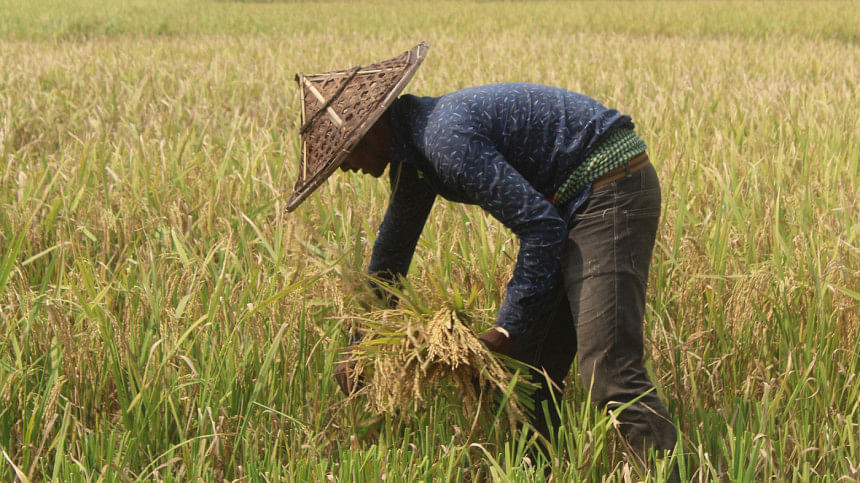Heat-tolerant rice varieties developed to curb yield losses from rising temperatures

Scientists have developed heat-tolerant rice varieties to address the severe impact of rising temperatures on rice production in Bangladesh, a development that may reduce an annual production loss of 12 lakh tonnes of paddy in the country.
"This innovation directly addresses the issue of high night temperatures, which disrupt the grain-filling process and reduce yields," said the International Rice Research Institute (IRRI) in a press release today (yesterday).
The Philippines-based organisation said researchers identified the rice varieties under a project funded by the Federal Ministry for Economic Cooperation and Development (BMZ), Germany, which aimed to mitigate the adverse effects of climate change and thereby enhance food security and improve the livelihoods of small farmers.
Led by IRRI, researchers at Bangladesh Rice Research Institute (BRRI) worked as a key partner of the initiative.
IRRI said climate change, characterised by rising temperatures and increased frequency of extreme weather events, significantly impacts rice production and yields.
"High night temperatures disrupt the grain-filling process in rice plants, leading to reduced yields and lower grain quality.
"In Bangladesh, this results in substantial annual losses in rice production, threatening food security and farmer livelihoods. As temperatures continue to rise, the need for heat-tolerant rice varieties becomes increasingly critical to sustain rice production and mitigate the adverse effects of climate change."
Researchers at IRRI have identified genes responsible for improving rice yield in higher night and day temperatures and developed rice varieties that thrive in both high day and night temperatures.
Under the project, the evaluation of 16 heat-tolerant rice lines was conducted in various regions of Bangladesh, including Lalpur, Gazipur, Dinajpur, Rajshahi, and Kushtia.
"The trials involved rigorous assessments of traits such as plant height, days to flowering, tiller numbers, fertility percentage, and yield under varying temperature conditions," said IRRI, adding that local stakeholders participated in the varietal selection trials.
The study showed that these rice lines were able to adapt to varying day and night temperatures, which ranged from 28˚C to 43˚C during the late Boro season trial in 2023, and 22˚C to 32˚C in the late Aus season of 2023, said the statement.
This breakthrough not only demonstrated the resilience of specific high-temperature tolerant genotypes to high temperatures but also emphasised the adaptability of selected genotypes for stable performance and improved rice production in heat-tolerant regions, it added.
"The trials have shown that the new rice lines can yield 1.5 to 2 tonnes more per hectare compared to traditional varieties, even under high night temperature conditions," said Nese Sreenivasulu, research unit leader-consumer-driven grain quality and nutrition, and BMZ heat project lead from IRRI.
"These results were consistent over three years of testing, indicating the robustness of the heat-tolerant genes identified," he said at event in Dhaka on June 25 organised to mark the closure of the project.
BRRI Director General Md Shahjahan Kabir said Bangladesh ranks 7th among the countries most affected by climate change.
"The impact is already significant and is expected to worsen over time, particularly affecting our agricultural output. Despite experiencing exceedingly high temperatures this year, we remain hopeful that with technological advancements and increased research, we can better prepare ourselves for these challenges."

 For all latest news, follow The Daily Star's Google News channel.
For all latest news, follow The Daily Star's Google News channel. 



Comments